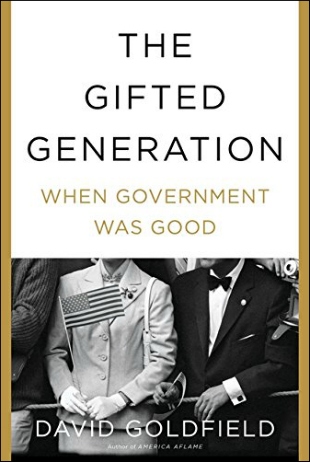"This book is about the first boomers — the gifted generation — born into America in the 1940s and early 1950s, and the gifts they received from government. Thanks to federal policies that eased the way for their parents and made achievement more realizable for themselves, they were twice as likely as their parents to attend college, also aided by the federal government. The boom economy after World War II hummed along in great part because of their needs: food, clothing, education, electronics, toys, and housing and everything that could go into a home from air-conditioning units to dishwashers to vacuum cleaners. Their educational attainments fueled the transformation of the nation’s economy and spurred innovation and invention. The gifts kept on giving, not only to the gifted generation and their offspring, but also to the commonwealth.
"What I call the commonwealth ideal defined governance in the United States during the first two decades after World War II. The ideal followed three basic principles of governance. First, government should enhance opportunities for all Americans. By benefiting individuals, public policy enhanced the commonwealth, in turn freeing its citizens to pursue their dreams. Second, the ideal charged government with the responsibility of balancing competing interests — individuals, business and industry, and government itself — to benefit the nation. Third, the commonwealth ideal required obedience to the rule of law. The constitution, as interpreted by the federal judiciary, serves as the ultimate guarantor of equality before the law.
"The ideal worked best when citizens believed the government kept their interests paramount. That was the case during the Great Depression and World War II. Once those crises ended, maintaining the commonwealth ideal became more difficult. Yet, for a remarkable twenty-year period following the war, the federal government did just that. Three presidents — Harry S. Truman, Dwight D. Eisenhower, and Lyndon B. Johnson, of similar family and geographic backgrounds, and each shaped by depression and war, expanded opportunities for a broad cross section of Americans, who, in turn, produced an era of prosperity and innovation. Public policy provided the gifts, and Americans, especially those of the gifted generation, ran with them.
"Government responded to the changing circumstances of American life; the baby boom, an economy transitioning to a postindustrial society, and the growing awareness that significant segments of the population — the poor, women, African Americans, and ethnic and religious minorities — encountered too many obstacles on the journey toward reaching their full potential. Major government initiatives in education, research, civil rights, welfare, and immigration followed. These were not merely top-down measures. Consciousness-raising books on gender, the environment, and poverty spurred federal action as well. Key legislation involved collaborations among organizations, individual citizens, and the government. Their combined efforts, marshaled by forward-looking presidents, created a more equitable, inclusive, and educated America. Government was indeed good. It was hardly surprising that, by the mid-1960s, nearly 80 percent of Americans believed that to be the case, compared with less that 20 percent in 2015. The gifted generation was indeed blessed."
